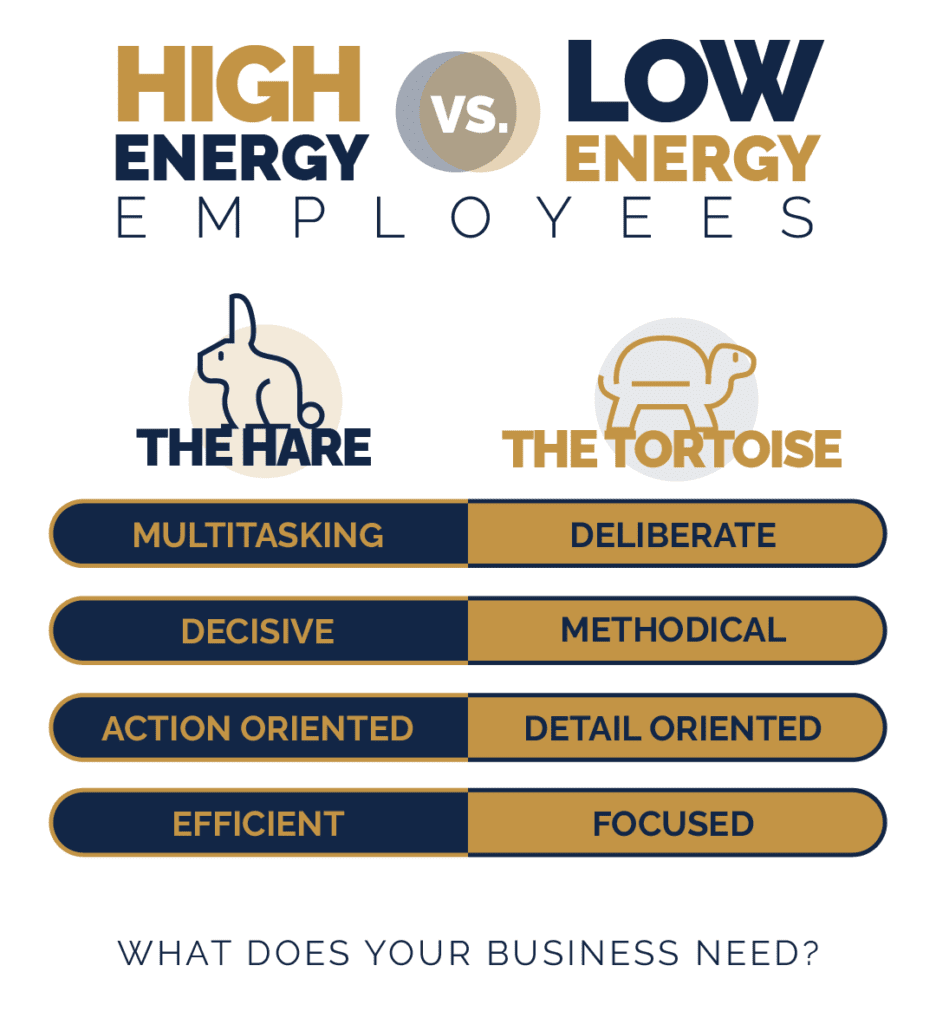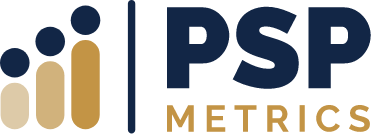Does your Business Need Energetic Employees?
Did you know that your energy level impacts the type of work you do?
Nearly 20% of employees say they have had to take some type of personality test during the hiring process.
One of the most frequently assessed work behaviors by PSP’s clients is ENERGY (aka, Drive), which can be defined as “One’s willingness and ability to maintain a high level of activity, work pace, and enthusiasm on the job”.
High-energy vs. Low-energy Employees
Those who score higher tend to move quickly, are good at multitasking, and can make decisions quickly. They need to stay busy and do not do well (and are not happy) in sedentary types of jobs where the pace is slower. In those cases, they often become bored and impatient.
Most would describe high-energy people as “action-oriented”. You might consider them to be more like the hare from the famous fable. However, workers with high energy would be very unlikely to take a nap, or even a break, when they are striving for an outcome. They tend to give consistent effort AND work quickly through tasks.
By contrast, a lower energy person is more deliberate and methodical in their work tempo and tends to run out of gas faster than higher energy workers. They are slower to get started and weaker at multitasking. These types are most successful (and satisfied) in more sedentary jobs where they are not required to juggle competing priorities, shift focus frequently, or make too many decisions in a short time. Low-energy people tend to be more detail and process-oriented, and less action-oriented. These are your tortoises.

Aesop’s famous fable tells the story of a tortoise who was ridiculed by the hare for being slow, and so challenges the hare to a race. The hare gets off to a fast start and quickly leaves the tortoise behind. Confident of winning, he takes a nap midway through the race. Upon awakening, he finds that his competitor, crawling slowly but steadily, has arrived before him. It’s a story that has been used for generations to reinforce important life lessons, one of which is that you should not ridicule others or brag. Another is that “slow and steady wins the race”. It’s about consistent effort. While a steady and consistent approach can be effective, in many jobs a consistently fast approach is even better.

Does your business need more tortoises or hares?
That depends on the types of jobs that make up your operation, but it is likely that you need BOTH.
For example, jobs such as Graphic Designer, Real Estate Appraiser, Loan Officer, and IT Security Analyst are a better fit for those who prefer to take a more deliberate and methodical approach to their work. A high-energy employee would likely perform poorly, and be unsatisfied, in such jobs.
However, jobs such as Registered Nurse, Customer Service Representative, Package Handler, and Barista are a better fit for those who thrive in fast-paced environments where there is little room for boredom and where being an action-oriented multitasker is critical for success.
The key is to ensure that you are matching an employee’s preferred approach to the requirements of the job.

Assessing Employee Energy
The good news is that individual differences in ENERGY can easily be measured during the pre-hire process, using validated personality tests. Many of these tests can be completed in less than 30 minutes and can provide insights that far outweigh the investment.
Energy can also be assessed through behavioral interviews, where applicants are asked to share examples of how they have handled a particularly busy workday or to share about a time when they got behind in their work. The key here is to probe for specific examples, the applicant’s actions, and the result of those actions.

If ENERGY is a key factor in job success, why not measure it before making that hiring decision? PSP customizes tools that enable hiring managers to know an applicant’s likelihood of demonstrating energy on the job.
PSP Metrics has been at the forefront of science-backed employee assessments and measurement systems for over 75 years. Our mission has always been to help give you a competitive business advantage through your company’s most valuable resource — your people.

Dr. Ken Graham
Dr. Ken Graham is a Principal Psychologist at PSP Metrics. He has extensive experience in talent management, developing high-performing executives and teams, and creating cutting-edge selection systems, executive assessments, and organizational design practices. Dr. Graham can be contacted at kgraham@pspmetrics.com or via LinkedIn.
Comments are closed.

